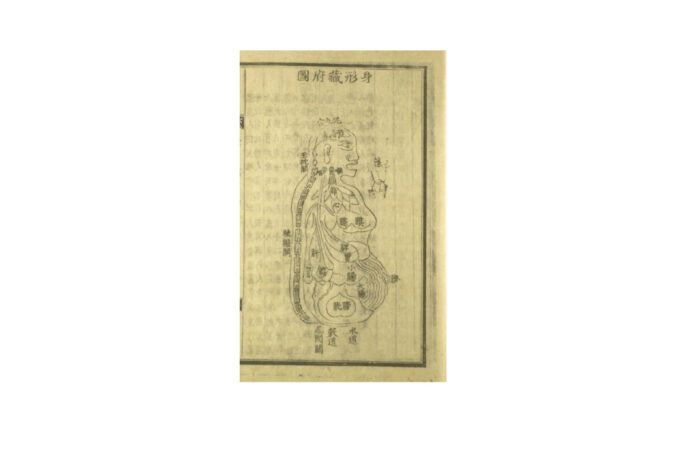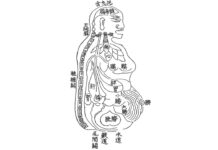
Written By Jun Heo(許浚, 1539~1615), Translated by Namil Kim, Wung Seok Cha et al., Published by Ministry of Health & Welfare (Korea)
07 Symptoms of Heart Disease 心病證심병증
① When the pathogen is in the heart, the pit of the stomach will be painful and the person will frequently feel sad and faint due to dizziness.
② When a kidney disease is transported to the heart and causes tightening of tendons and pulses, it is called muscular spasms.
③ The heart heat causes a red facial complexion with the overflowing of blood over to the collateral.
④ External signs of heart disease are the reddened face, dried mouth, and a tendency to smile. The internal sign is stirring qi felt above the umbilicus, which is hard with pain on pressing. The patient with heart disease will have chest discomfort, heart pain, hot palm, and nausea. These symptoms indicate heart disease.
⑤ When the bones and muscles of the thigh gets skinny with chest fullness, dyspnea, chest pain, and pulling pain from shoulder to the nape, the patient will die in a month. When the death pulse appears, it means that the patient will die soon. Annotation says, “This refers to the heart. The patient will die within 30 days.”
⑥ A person being forgetful with palpitations, anxiety, chest discomfort, and sadness all result from deficient heart-blood.
08 Deficiency and Excess of Heart Disease 心病虛實심병의 허실
① The heart stores vessels and the spirit dwells in vessels. When heart qi is deficient, the person will feel sad, and when heart qi is excessive, the person will continuously laugh.
② When the heart is excessive, the person may experience pain in the chest, under the ribcage, between the chest and scapula, and on the medial parts of both arms. When the heart is deficient, the person’s chest and stomach become full with pain under the rib-sides and back.
③ The heart stores the spirit. When the spirit is excessive, the person will not be able to stop laughing, and when the spirit is
deficient, the person will feel sad.
09 Day and Time When Heart Disease Is Relieved or Aggravated 心病間甚 심병이 낫거나 심해지는 때
① When a disease is in the heart, it is relieved in the long summer. If it is not relieved in the long summer, it is aggravated in winter. If the person does not die in winter, it is maintained in spring and is relieved in summer.
② The heart disease is relieved on the days of Mu and Gi (戊己日). If it is not relieved on the days of Mu and Gi (戊己日), it is aggravated on the days of Yim and Gye (壬癸日). If the person does not die on the days of Yim and Gye (壬癸日), it is maintained on the days of Gab and Eul (甲乙日) and is relieved on the days of Byeong and Jeong (丙丁日).
③ The heart disease is relieved during the day and aggravated at night. It becomes stable at dusk.
10 There Is No Transport Point in the Hand Lesser Yin Meridian 手少陰無輸 수소음경에는 수혈이 없다
Huangdi (黃帝) asks, “Why is it that the hand lesser yin meridian does not have a transport point?” Qibo (岐伯) answers, “Lesser yin is the heart meridian. The heart is the owner and king of the five viscera and six bowels where the essence-spirit stays. The organ is stable so the pathogen cannot enter. If the pathogen invades, then the heart is damaged, and if the heart is damaged, the spirit leaves. If the spirit leaves, the person dies.
Therefore, the pathogen in the heart refers to the pathogen in the heart’s pericardium collateral. Because the heart controls the pericardium collateral, there is no transport point for the hand lesser yin meridian.” Huangdi (黃帝) asks, “Is the reason the heart does not get diseased because there is no transport point in the hand lesser yin meridian?” Qibo (岐伯) answers, “The meridian or collateral outside the heart can get diseased, but the heart itself does not get diseased. Thus, we find the meridian from HT7 on the palm-side wrist.
11 Treatment Methods for Heart Disease 心病治法 심병 치료법
① Since the heart dislikes stretching, sour taste should be used to contract it. Annotation says, “The reason why the heart suffers from stretching is because heart qi is deficient.” The heart likes to become soft. Therefore, it should be softened by a salty taste. Tonify with a salty taste and purgate with a sweet taste.
② When the heart suffers from stretching, use Schisandrae Fructus (五味子). Also, use stir-fried salt for a heart deficiency. When the heart becomes soft, tonify with Natrii Sulfas (芒硝) and purgate with Glycyrrhizae Radix (甘草). This is for excessive heart qi.
③ For heart disease, a sour taste should be taken. Eat red beans, dog meat, plums, and chives which all have a contracting effect.[B232] ④ Eat barley, lamb meat, plum, and rakkyo. This is taking the original tastes.
⑤ Use Qian’s Calm Spirit Pill, Calm Spirit Cinnabar Pill (朱砂安神丸) (formulas are given in the chapter on Spirit), and Revive Heart Powder for the Heart deficiency. Use Drain Heart Decoction (瀉心湯), Guide Out Red Powder, and Ten Ingredients Guide Out Red Powder for the heart excess.
⑥ Do not eat warm food or wear warm clothes when the heart is diseased.
- Qian’s Calm Spirit Pill 錢氏安神丸 전씨안신환: It tonifies heart deficiency. 1 nyang of Cinnabaris (朱砂) (levigated), 5 don of Liriopis Tuber (麥門冬), Mirabilitum (馬牙硝), Poria Sclerotium (白茯苓), Dioscoreae Rhizoma (山藥), Glauberite (寒水石), and Glycyrrhizae Radix (甘草), 2.5 pun of Borneolum (龍腦). Grind these and knead with honey. Make 30 pills per 1 nyang. Melt 1 pill at a time into sugar water and drink.
- Revive Heart Powder 醒心散 성심산: It treats deficient heat of the heart. The same amounts of Ginseng Radix (人
蔘), Liriopis Tuber (麥門冬), Schisandrae Fructus (五味子), Polygalae Radix (遠志), Poria Sclerotium (茯神), Rehmanniae Radix Crudus (生地黃), and Acori Gramineri Rhizoma (石菖蒲). Cut these and decoct in water before taking. - Drain Heart Decoction 瀉心湯 사심탕: ① It treats heart heat. Put 5 pun, 2.5 pun, or 1 don of ground Coptidis Rhizoma (黃連) in warm water. ② This is also called a Coptidis Rhizoma Purge Heart Decoction.
- Guide Out Red Powder 導赤散 도적산: Although it treats heart heat, it is actually a prescription for the small intestine. The composition is described later.
- Ten Ingredients Guide Out Red Powder 十味導赤散 십미도적산: It treats sores in the mouth and tongue due to excessive heart heat and palpitations due to surprise. 5 pun of Coptidis Rhizoma (黃連), Scutellariae Radix (黃芩), Liriopis Tuber (麥門冬), Pinelliae Tuber (半夏), Lycii Radicis Cortex (地骨皮), Poria Sclerotium (茯神), Paeoniae Radix (赤芍藥), Akebiae Caulis (木通), Rehmanniae Radix Crudus (生地黃), and Glycyrrhizae Radix (甘草). Cut these to make 1
package. Boil 1 package with 5 pieces of ginger and drink. - Another Prescription: Use raw Coptidis Rhizoma (黃連) as the sovereign herb and a small amount of Cinnamomi Cortex Spissus (肉桂) (rich in flavor and rolled) as the assistant herb. Boil these herbs in water and mix with honey. Take on an empty stomach. It will connect the heart and kidneys.



































